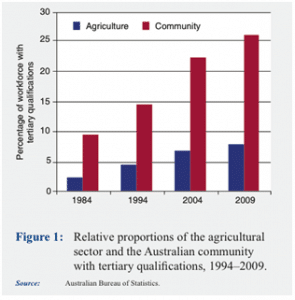Why Agribusinesses Must Entice More Students into the sector?
With the number of children studying agriculture in high schools dropping significantly in the past 15 years, agribusinesses must play a larger role in encouraging students to take an interest in the industry. In 1997, more than 2,200 Year 12 students in NSW studied agriculture courses for their HSC. But in 2012, that figure was…
With the number of children studying agriculture in high schools dropping significantly in the past 15 years, agribusinesses must play a larger role in encouraging students to take an interest in the industry.
In 1997, more than 2,200 Year 12 students in NSW studied agriculture courses for their HSC. But in 2012, that figure was down to around 1,300, according to Board of Studies figures.
Perhaps an even more alarming figure is the drop between Year 10 students studying agriculture and those who go on to take it for the HSC.
In 1997, 7000 Year 10 students in NSW studied agriculture. Just 2,200 took it for the HSC that year.
In 2012, 6,800 students in Year 10 studied agriculture but only 1,300 completed it in Year 12.
Dearth of agriculture university graduates
Those low numbers filter right through into university. Currently only around 300 agricultural student graduate with degrees each year, with around another 400 graduating in related degrees.
According to Emeritus Professor Jim Pratley of Charles Sturt University, this amounts to only around 20% of the graduates that are needed to fill the current job vacancies in farming and agribusiness.
“Capacity therefore looms as the most significant issue for the agricultural industry,” Dr Pratley wrote in his report, Professional Agriculture – a case of supply and demand.
As research and development and advanced technology systems are increasingly integrated into agribusinesses, top quality graduates are more important than ever.
“The industry, from the farm, the service and post-farmgate sectors and in R&D, requires a workforce which is highly educated, highly skilled and with an image and reputation that is attractive to the best and brightest,” wrote Dr Prately.
“As markets become more discriminatory in respect of quality and production practices, accreditation will become increasingly important and the industry will need to have robust mechanisms in place to assure those markets.”
Agricultural graduates: numbers lag behind general community
The skills shortages in agriculture are not being matched in other industries. As the graph from the Australian Bureau of Statistics shows, the gap between degree holders in the community in general and those in agricultural industries is growing.

“The challenge is to make prospective students aware that careers in agriculture are at least as interesting, rewarding and challenging as in most other industries,” Dr Prately says.
He says the industry needs to work on its image as being conservative and out of touch.
Managing Director of Agricultural Appointments, Dr Ray Johnson, agrees but says agribusinesses need to be proactive in promoting themselves: “With the emerging skills shortage in Australian agriculture it is imperative that companies have a method for attracting and retaining new graduates.”
“This takes a significant amount of thought and preparation, and a lot of groundwork in attending university career events to showcase your company,” he says.
To find out more about the trends in the agribusiness sector in Australia, including on employment and remuneration, download our free eBook, “The 2015 Agribusiness Salary and Trend Report”.
The Latest Updates
Let’s look at the current trends in job demand and talent availability in the agriculture and agribusiness sector in Australia over the second half of 2023 and the first quarter of 2024. There was a weakening of job demand in this sector but a slight improvement in candidate availability and job interest during this period….
In times past, people’s working lives often played out over many years at one company, but now the world has vastly changed. These days it is common to shift between jobs and organisations, but this practice raises questions as to what is today considered the Goldilocks time to spend in a job? How often do…
Employee retention matters. Organisational issues such as training time and investment, lost knowledge, mourning, insecure co-workers and a costly candidate search aside; failing to retain a key employee is costly. Various estimates suggest that losing a middle manager costs an organisation up to 100 percent of their salary. The loss of a senior executive is…











